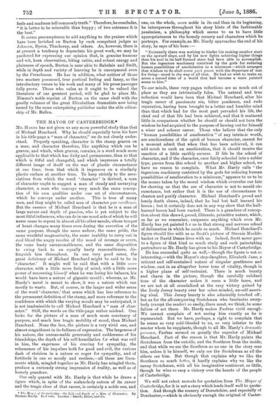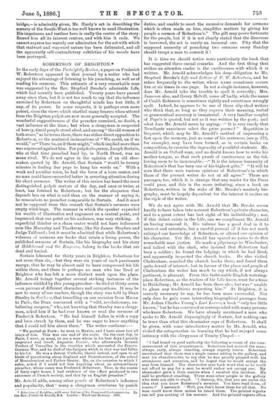THE MAYOR OF CASTERBRIDGE.*
Ma. HARDY has not given us any more powerful study than that of Michael Henchard. Why he should especially term his hero in his title-page a " man of character," we do not clearly under- stand. Properly speaking, character is the stamp graven on a man, and character therefore, like anything which can be graven, and which, when graven, remains, is a word much more applicable to that which has fixity and permanence, than to that which is fitful and changeful, and which impresses a totally different image of itself on the wax of plastic circumstance at one time, from that which it impresses on a similarly plastic surface at another time. To keep strictly to the asso- ciations from which the word character' is derived, a man of character ought to suggest a man of steady and unvarying character, a man who conveys very much the same concep- tion of his own qualities under oue set of circumstances, which he conveys under another. This is true of many men, and they might be called men of character par excellence. But the essence of Michael Henchard is that he is a man of large nature and depth of passion, who is yet subject to the most fitful influences, who can do in one mood acts of which he will never cease to repent in almost all his other moods, whose temper of heart changes many times even during the execution of the same purpose, though the same ardour, the same pride, the same wrathful magnanimity, the same inability to carry out in cool blood the angry resolve of the mood of revenge or scorn, the same hasty unreasonableness, and the same disposition to swing back to an equally hasty reasonableness, dis- tinguish him throughout. In one very good sense, the great deficiency of Michael Henchard might be said to be in `character.' It might well be said that with a little more character, with a little more fixity of mind, with a little more power of recovering himself when he was losing his balance, his would have been a nature of gigantic mould ; whereas, as Mr. Hardy's novel is meant to show, it was a nature which ran mostly to waste. But, of course, in the larger and wider sense of the word character,' that sense which has less reference to the permanent definition of the stamp, and more reference to the confidence with which the varying moods may be anticipated, it is not inadmissible to call Michael Henchard a " man of char- acter." Still, the words on the title-page rather mislead. One looks for the picture of a man of much more constancy of purpose, and much less tragic mobility of mood, than Michael Henchard. None the less, the picture is a very vivid one, and almost magnificent in its fullness of expression. The largeness of his nature, the unreasonable generosity and suddenness of his friendships, the depth of his self-humiliation fjr what was evil in him, the eagerness of his craving for sympathy, the vehemence of his impulses both for good and evil, the curious dash of stoicism in a nature so eager for sympathy, and of fortitude in one so moody and restless,—all these are linea- ments which, mingled together as Mr. Hardy has mingled them, produce a curiously strong impression of reality, as well as of homely grandeur.
Our only quarrel with Mr. Hardy is that while he draws a figure which, in spite of the melancholy natnre of its career and the tragic close of that career, is certainly a noble one, and
• The Mayor of Ca,terhridge the Life and Deaoh of a Man of Character. By Thomas Hardy. In 2 vole. London : Smith, Elder, and Co.
one, on the whole, more noble in its end than in its beginning, he intersperses throughout his story hints of the fashionable pessimism, a philosophy which seems to na to have little appropriateness to the homely scenery and characters which he portrays. For example, as Mr. Hardy approaches the end of his story, he says of his hero :—
" Externally there was nothing to hinder his making another start on the upward slope, and by his new lights achieving higher things than his soul in its half-formed state had been able to accomplish. But the ingenious machinery contrived by the gods for reducing human possibilities of amelioration to a minimum—which arranges that wisdom to do shall come pari passu with the departure of zest for doing—stood in the way of all that. He had no wish to make an arena a second time of a world that had become a mere painted scene to him."
To our minds, these very pagan reflections are as much out of
place as they are intrinsically false. The natural and true reflection would have been that Michael Henchard, after his tragic career of passionate sin, bitter penitence, and rude reparation, having been brought to a better and humbler mind than that which had for the most part pervaded his life, the chief end of that life had been achieved, and that it mattered little in comparison whether he should or should not turn the wisdom he had acquired to the purpose of hewing out for himself a wiser and soberer career. Those who believe that the only " human possibilities of amelioration " of any intrinsic worth, are ameliorations of the spirit of human character, cannot for a moment admit that when that has been achieved, it can add much to such an amelioration, that it should receive the sanction of a little earthly success. If life be the school of character, and if the character, once fairly schooled into a nobler type, pasies from this school to another and higher school, we have no reason to complain. What Mr. Hardy calls "the ingenious machinery contrived by the gods for reducing human possibilities of amelioration to a minimum," appears to us to be the means taken by the moral wisdom which overrules our fate for showing us that the use of character is not to mould cir- cumstance, but rather that it is the use of circumstance to chasten and purify character. Michael Henchard's proud and lonely death shows, indeed, that he had but half learned his lesson ; but it certainly does not in any way show that the half- learned lesson had been wasted. There is a grandeur of concep- tion about this shrewd, proud, illiterate, primitive nature, which, so far as we remember, surpasses anything which even Mr. Hardy has yet painted f( .r us in that strong and nervous school of delineation in which he excels so much. Michael Henchard's figure should live with us as Scott's picture of Steenie Muckle- backet or David Deans lives with us. Indeed, Scott never gave to a figure of that kind so much study and such painstaking portraiture as Mr. Hardy has given to his Mayor of Casterbridge.
He has succeeded quite as well,—though the figure is not so interesting,—with the Mayor's step-daughter, Elizabeth Jane, a reticent and self-contained nature of singular gentleness and wisdom, cast in an altogether lower tone of vitality, though in a higher plane of self-restraint. There is much beauty and charm in the picture, though the carefully subdued tone of the character makes it seem a little tame, and we are not at all scandalised at the easy victory gained by the lively Jersey beauty over her sober-minded, un-self assert- ing rival. This Jersey beauty is also admirably touched off ; but as for the all-conquering Scotchman who fascinates every- body (except the reader) so easily, there must, we think, be some failure of art there. Mr. Hardy makes Farfrae vivid enough-- We cannot complain of not seeing him exactly as he is represented. But we have, perhaps, a right to complain that he seems so very cold-blooded to us, so very inferior to the master whom he supplants, though to all Mr. Hardy's dramatis personae, Farfrae seemed so greatly the superior of Michael Henchard. Part of the reason is that Mr. Hardy paints the Scotchman from the outside, and the Southron from the inside, and that while we see the Southron as no one in the story sees him, unless it be himself, we only see the Scotchman as all the others see him. But though that explains why we like the Southron so much better, it hardly explains wby we like the canny Scotchman, with all his imaginative sentiment, so little, though he wins so easy a victory over the hearts of the people of Casterbridge.
We will not select morsels for quotation from The Mayor of Casterbridge, for it is not a story which lends itself well to quota- tion. And though the scenery of Dorsetshire, and especially of Dorchester,—which is obviously enough the original of Caster- bridge,—is admirably given, Mr. Hardy's art in describing the scenery of the South-West is too well known to need illustration. His impetuous and restless hero is really the centre of the story. Round him all its interest centres, and with him it ends. We cannot express too warmly our admiration for the art with which that stalwart and wayward nature has been delineated, and all the apparently self-contradictory subtleties of his moods have been portrayed.



































 Previous page
Previous page